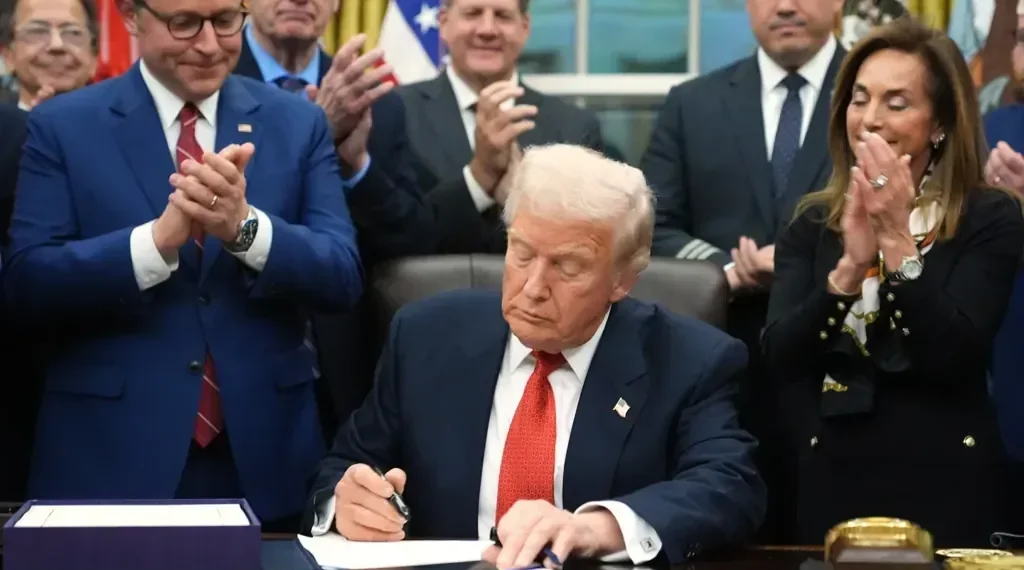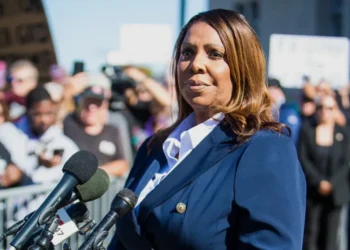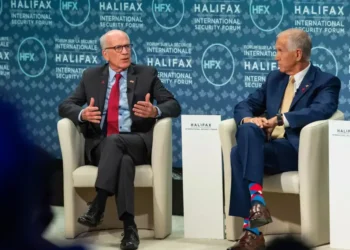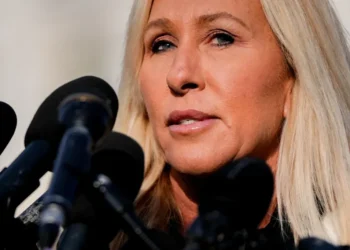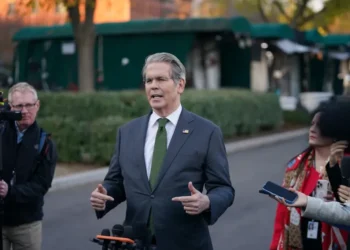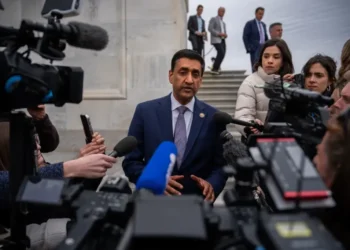The United States government reopened Wednesday night after President Donald Trump signed a long-awaited funding bill, bringing an end to a record 43-day shutdown that disrupted federal operations, strained public services, and left thousands of workers without pay. The measure passed both chambers of Congress following weeks of gridlock that deepened partisan divisions in Washington.
Partisan deadlock reaches breaking point
The shutdown, the longest in U.S. history, began as negotiations collapsed over Democratic demands to extend an enhanced health care tax credit that helps reduce costs for millions of Americans purchasing coverage through Affordable Care Act marketplaces. Republicans resisted linking the tax credit to short-term government funding, framing it as a separate policy dispute.
The standoff forced hundreds of thousands of federal employees to miss paychecks, closed national parks, disrupted air travel, and drove growing numbers of workers to food banks across the country.
President Trump signed the funding bill hours after the House approved it by a 222–209 vote, largely along party lines. The Senate had passed the measure earlier in the week.
Addressing the public from the White House, Trump placed blame on Democrats, accusing them of prolonging the shutdown for political gain. “You should not forget this,” he said. “When we come up to midterms and other things, don’t forget what they’ve done to our country.”
A bitter end after weeks of stalemate
Tensions flared during floor debates in both chambers as lawmakers vented frustration over the shutdown’s toll.
Republicans accused Democrats of using the closure as leverage in the health care debate. “They knew it would cause pain and they did it anyway,” said House Speaker Mike Johnson.
Democrats countered that the Republican-controlled House had previously pushed through tax cuts benefiting the wealthy while failing to protect middle-class families facing rising health care costs. “This bill leaves families twisting in the wind with zero guarantee there will ever be a vote to extend tax credits to help everyday people pay for health care,” said Rep. Jim McGovern of Massachusetts.
Democratic Leader Hakeem Jeffries vowed the party would continue fighting for the extension, saying, “This fight is not over. We’re just getting started.”
Inside the deal that ended the shutdown
The final compromise was crafted by a bipartisan group of eight senators after it became clear that neither side would fully prevail. The agreement funds three of the 12 annual federal spending bills through the fiscal year and extends funding for all other government agencies until January 30.
Republicans also committed to holding a Senate vote by mid-December on extending the expiring health care subsidies, though there is no guarantee the measure will succeed.
Key provisions in the legislation include:
Reinstatement of federal workers dismissed during the shutdown and protection from further layoffs through January.
Back pay guarantees for federal employees affected by the funding lapse.
Continued funding for food assistance programs administered by the Agriculture Department, ensuring benefits remain uninterrupted.
Security enhancements, including $203.5 million for congressional protection and $28 million for Supreme Court justices’ security.
The bill also contains a controversial clause allowing senators to sue if their electronic records are searched by federal agencies without notice, with potential damages of up to $500,000 per violation. The language, reportedly added late in negotiations, drew criticism from both parties.
“That was dropped in at the last minute, and I did not appreciate that, nor did most of the House members,” Speaker Johnson said, promising a separate vote on the provision next week.
Health care subsidies remain the major sticking point
The sharpest division remains over the enhanced Affordable Care Act tax credit, which Democrats argue is essential to prevent millions from losing coverage. Republicans contend that the pandemic-era subsidies are no longer necessary.
“It’s a subsidy on top of a subsidy,” said Rep. Tom Cole, Republican chair of the House Appropriations Committee. “COVID is over. They chose the date those subsidies would run out.”
Former House Speaker Nancy Pelosi rejected that framing, saying the credit was designed to expand access to health care. “All they have done is try to eliminate access to health care in our country,” she said. “The country is catching on to them.”
Without the extension, the Congressional Budget Office projects that premiums could more than double for millions of Americans, while over 2 million people could lose coverage entirely next year.
Senate faces renewed health care battle
Attention now shifts to the Senate, where debate over the tax credits will resume ahead of the December deadline. Some moderate Republicans, including Sen. Susan Collins of Maine, have signaled openness to extending the subsidies with new income caps to limit eligibility.
“I support continuing the credits, but with sensible adjustments,” Collins said earlier this week. “We must ensure the assistance reaches those who truly need it.”
Democrats have expressed cautious interest in such revisions but remain skeptical that the Republican-led House will follow through. “Republicans have wanted to repeal the Affordable Care Act for 15 years,” said Rep. Rosa DeLauro, the top Democrat on the House Appropriations Committee. “That’s where they’re trying to go.”
For now, federal agencies are reopening, employees are returning to work, and basic services are resuming nationwide. But with the health care subsidy fight unresolved, Washington faces the possibility of another funding confrontation early next year—an outcome both parties insist they want to avoid, but few seem confident they can prevent.
This article was rewritten by JournosNews.com based on verified reporting from trusted sources. The content has been independently reviewed, fact-checked, and edited for accuracy, neutrality, tone, and global readability in accordance with Google News and AdSense standards.
All opinions, quotes, or statements from contributors, experts, or sourced organizations do not necessarily reflect the views of JournosNews.com. JournosNews.com maintains full editorial independence from any external funders, sponsors, or organizations.
Stay informed with JournosNews.com — your trusted source for verified global reporting and in-depth analysis. Follow us on Google News, BlueSky, and X for real-time updates.
